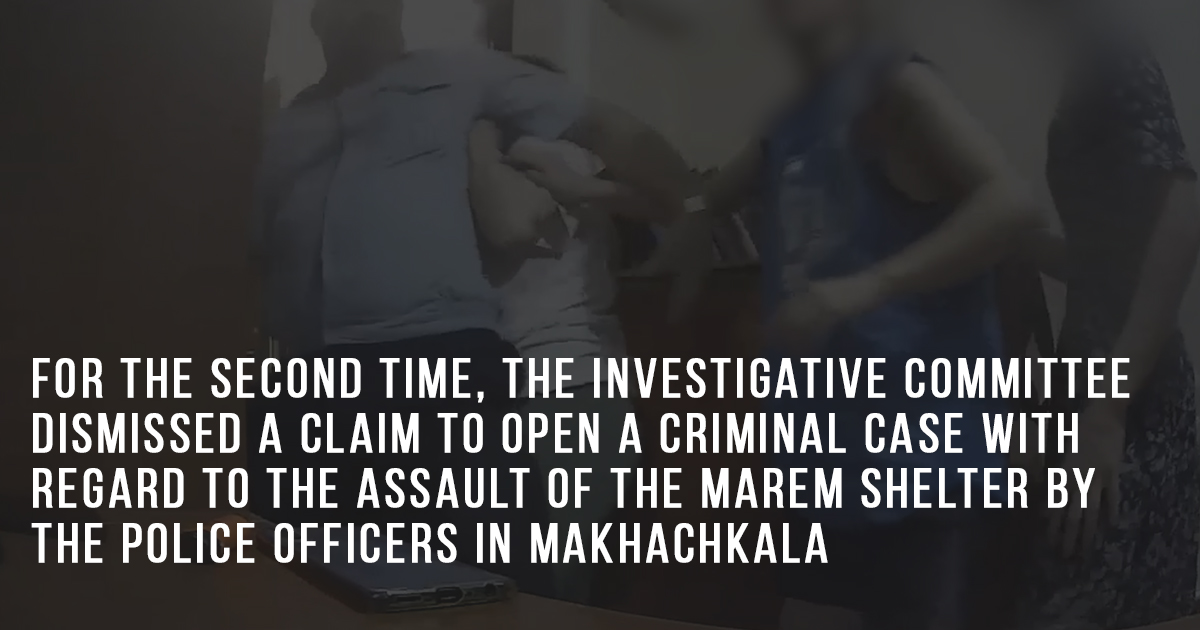For the second time, the Investigative Committee dismissed a claim to open a criminal case with regard to the assault of the Marem project crisis apartment by the police officers in Makhachkala. The police officers used violence to seize Khalimat Taramova and handed over her to her family – the girl fled from home over the battery related to her sexual orientation. Three other women applied for medical assistance. The investigators did not find any element of crime in the actions of law-enforcement officers.
On 12 June, journalist and human rights defender Svetlana Anokhina (Amirova), her colleague Maysarat Kilyaskhanova, Iraida Smirnova and her daughter Eva Daudova applied to the Committee Against Torture. The applicants told human rights defenders that, on 10 June, police officers Dalgat Vagabikhmayev and Timur Guseynov came to the crisis apartment of the Marem project. According to the women, they consulted a lawyer and opened the door to let Vagabikhmayev in the apartment for questioning Khalimat Taramova. After that the police officers left.
From the ruling on dismissal of the claim to open a criminal case it follows that at that time Taramova’s father informed the police officers that his daughter was undergoing treatment from drug dependence and was unable to realize her actions. According to Ayub Taramov, human rights defenders, allegedly, used his daughter’s condition to keep her in the crisis apartment. As we have previously reported, left the Chechen territory due to battery and threats to her life over her sexual orientation. In the crisis apartment, he was waiting for a possibility to move to the safe place.
On the same evening, police officer Vagabikhmayev returned and asked to let him in, according to Svetlana Anokhina. However, several police officers entered the apartment together with him, and about 30 more were outside and in the street – the whole special operation. They dragged the girls who were in the shelter out of the apartment and, after having pulled them down the stairs, apprehended them, according to the human rights defender.
“I was shouting that I had a heart stroke previously. I felt dizziness in my head, everything seemed foggy, — Svetlana Anokhina remembers, — Three men were carrying me with my head down, one was holding me by my legs, two – by my arms. They dropped me two times. The first time I hit with a back of my head, the second time – with my lower back. Each time I hit the steps”.
The apprehended were delivered to the District Department of the Interior for the Leninsky District of Makhachkala, where they were questioned. Anokhina felt bad at the police department and an ambulance was called for her. Administrative protocols were drawn up on the women. On 11 June, the court did not find any criminal element in their actions.
Later on, the medics diagnosed Anokhina with hematomas on the arms and legs and a contusion of the index finger of the left hand. Kilyaskhanova was registered with hematomas on the right leg and both arms, Smirnova had hematomas all over her body, and a contusion of the back. According to the woman, after what happened she developed problems with her lower back, she had troubles bending, unbending and walking.
The law-enforcement officers involved in the assault of the shelter, claim that they apprehended the applicants after they started to “push away” the police officers from the apartment door for no reason. Police officer Dalgat Vagabikhmayev told the investigators that at the entrance of the porch the women lay down on the steps and were rolling down, “ignoring the demands and persuasions to calm down”.
“We assume that the Dagestan police officers unofficially “supported” the return of Taramova to her relatives, — lawyer with the North Caucasian branch of the Committee Against Torture Konstantin Gusev comments, — There is a notion of “adequacy of applying physical force”. When there are several dozens of armed men against a few women, it is too much, to put it mildly. The police officers’ actions contain the elements of crime under part 3 of Article 139 and item “a” of Part 2 of Article 286 of the Criminal Code of the RF: “illegal entry of a dwelling by abuse of office” and “abuse of office”.
